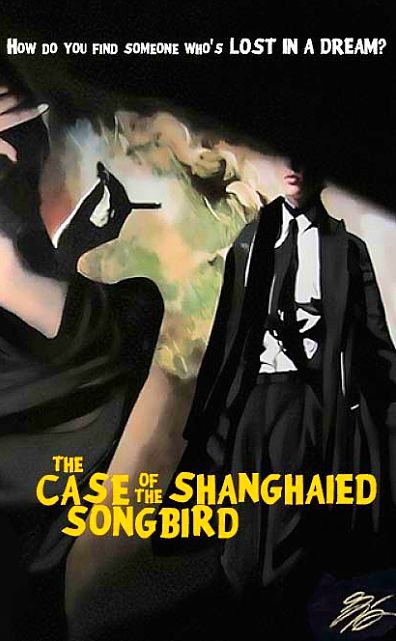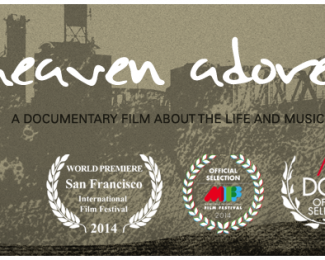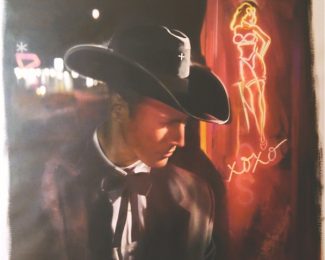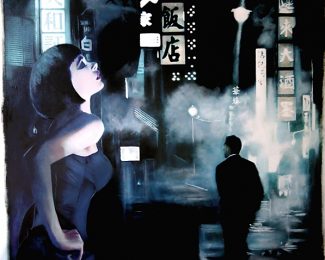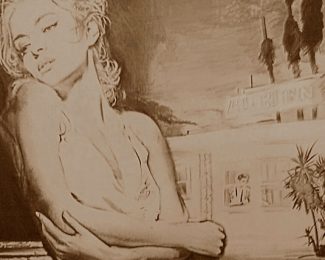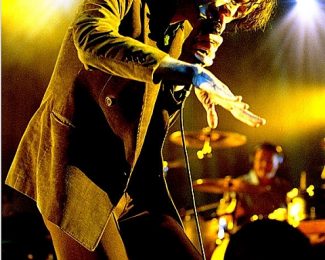In Fyodor Dostoyevsky’s masterpiece novel ‘Crime and Punishment,’ the guilt-plagued Raskolnikov, while on his journey from transgression to redemption, experiences a series of mysterious conincidences in which cause and effect appear to occur spontaneously. While Dostoyevsky’s skillful use of happenstance was by no means accidental, the concept of a linked past, present and future, once belonging to the realm of esoteric conjecture, has since become a scientifically proven example of quantum physics.
Several decades of experimentation with the ancient Chinese oracle, ‘I Ching,’ led Swiss psychologist Carl Jung to attach a name to this phenomenon in his groundbreaking work, ‘Synchronicity – An Acausal Connecting Principle.’ The year was 1952.
During this same time period, some 9,000 miles away, amidst the towering Victorian backdrop of early 1950’s Melbourne, a down on his luck detective is about to discover how Carl Jung, an enigmatic jazz chanteuse, and a semi-conscious young woman lost in a dream will synchronistically provide the clues which enable him to finally reconcile the ghosts of his haunted past.

Flash-forward to 21st June 2016 – the summer solstice.
I received an email from Australian writer/filmmaker Scott Lewis, enquiring if I would be interested in designing artwork for a new film noir screenplay he had written entitled, ‘The Case of the Shanghaied Songbird.’
At the time of reading this email, I was listening to Perth’s Tame Impala – a track called ‘Nothing That Has Happened So Far Has Been Anything We Could Control,’ and thinking, what a great title for a painting! My next thought was…it’s winter solstice in Australia.
Scott subsequently forwarded me his script, explaining the lead character will be played by well-known Australian actor, Jack Campbell, who now calls LA home, but is known for his work in the popular medical drama ‘All Saints.’

Actor, Jack Campbell
Unbeknownst to Jack, Scott had subsequently cast multi-talented actress, Natalie Mendoza (Jackie Clunes in the British drama series, Hotel Babylon) for the role of the beautiful jazz chanteuse. As it happened, Jack and Natalie not only knew of each other, but were friends.

Actress, Natalie Mendoza
After reading the screenplay, I am thrilled to be connected with this project and what I feel will not only be viewed as an enchanting visual manifestation of the essence of noir filmmaking, but will most certainly be destined for film festival acclaim.
– the universe operates on its own vibration, and sometimes…
if we’re listening…
we find synchronicity.
A: I have always been drawn to film noir and included aspects of it in previous short films, but this will be the first one that uses all the traditional elements of a 1940’s and 50’s noir. It will include many of the characteristics of the classics including the cynical sleuth, the sassy secretary and the sultry femme fatale.
I would love to shoot this on black & white 16mm film to really achieve that traditional look. Although in Australia, film stock and process labs have become very elusive and therefore expensive. Either way we will do our best to achieve the older style film look. The use of space in a noir film is an aspect that I find very charming and has infinite creative potential. I am looking forward to creating some rich black spaces in the mise en scene of the shots. I have learnt, as most artist do, that sometimes it’s what you leave out that can really speak. And film noir can do this beautifully. The viewer can project his/her own fantasies into that space?
I think Australia can lend itself to noir because of its vast empty space and this can be mysterious. Some recent Australian films have captured this beautifully like ‘Strangerland’ and ‘Mystery Road.’ These vast empty spaces in Australia may also account for our predication for telling stories about being lost. In this film, the Private Detective is attempting to find a girl who is lost in a dream.

Ivan Sen Film – Mystery Road

Film – Stranger Land
I am very attracted to the distinctive American Film Noir, and this story will be told in a similar style to that, but using the Gothic architecture and bluestone laneways of Melbourne.

Laneways of Melbourne
It’s 1954 Melbourne, Burn City. Private Detective, Frank Drennan, has been down and out not for too long. He has a head full of eel juice and drags his heart around on a fifty pound chain. Jobs are far and few between and his shadow is a reflection of a once successful detective. A case arrives at his office, and with his reluctance it will take him into a world of sultry jazz club singers, surreal dreams, metaphysical philosophies, a mysterious comet and a sleeping beauty, all to solve ‘The Case of the Shanghaied Songbird.’
A: There is a scene in the film set in a smoky oriental style jazz club where the character Vera will be singing a slow dreamlike song. The song will be similar to the old Cole Porter track ‘All Through the Night’ sung by Julie London in the 60’s.
Our Jazz chanteuse Vera will be played by Natalie Mendoza. Natalie comes from a Jazz musician family and has performed in many stage musicals including leads in Les Miserable and Miss Saigon. Natalie has suggested that she compose and perform a track in this style exclusively for the film.
I shot and cut a teaser video without the actors (as they are working overseas) and a local saxophone player Harry Cooper plays a cool little piece on that. In the film we will have him playing his saxophone in an old phone box and the sound will drift down a lonely street as the detective walks in the night gathering his thoughts. Gabrielle Sing who plays Janet the secretary, is also a lovely singer. She originally auditioned for Vera until I decided that it would be perfect if our femme fatale character Vera was of Chinese heritage.
And interestingly enough our head of Costume Department Clare St Clare is also a sensational singer and performer who evokes a different era. Clare performed a few tracks with the amazing Mikelangelo at the premiere of my short film Lily a few years back. I hope to enlist those guys to compose a track for the closing credits.

A: I guess when you make a film that involves dreams you have to invite Jung along to the party.
When our private detective is researching esoteric matters to help him understand the case, he stumbles upon a film reel of Carl Jung discussing the Theory of Collective Unconscious and how it connects everyone on a certain level. Whether this is the doorway that the private detective uses to enter the dream or not, I guess you will just have to see the film and find out!
I have always been attracted to Jung’s theories and have also used his words in a previous short film Shadow Dreams. His work with dreams and symbolism is so enlightened. And then there is his work with synchronicity, alchemy and I Ching. One could easily be inspired to create a whole series of short films.
When writing the dream sequence I intended to use the motif of time and how time correlates with the mind, but not with the being or our true nature. So there is symbolism and dialogue in this scene that points to that idea. But to be honest it wasn’t until some time afterwards, that I noticed there was many more layers of symbolism that relates to the story.
It is Frank’s epiphany in relation to time that may unlock him from his own mental slavery and be the key to solving the case. So there is a sort of redemption in this film that isn’t a usual trait in many other film noir movies that I have seen.
Raymond Chandler’s Phillip Marlowe is definitely the kind of character that Frank Drennan could be modeled off. I only recently discovered the old radio plays and love that hard-boiled dry wit, charisma, cynicism and ultimately good heart of the Phillip Marlowe character. I wouldn’t say Frank Drennan is a parody of this, but more like a knowing wink.
I drew inspiration from movies like The Big Sleep, The Maltese Falcon, The Killers, The Blue Dahlia and Double Indemnity to get a handle on the language. I also just made up quite a few expressions myself, which was a lot of fun!

A: Apart from the final dream sequence, I hope for the entire film to have a dreamlike feel to it. And again, that disjointed time that you mentioned. I think someone like Michel Gondry does this very well and I do love ‘Eternal Sunshine of the Spotless Mind.’

It’s inspiring to see that many of the wonderful effects in this film were done ‘in camera’ rather than CGI. I hope we can use some of those techniques on this film. In the past I have experimented with creating scratch films using 16mm found film. Basically this is where you manipulate the emulsion of the film directly by scratching it, adding ink and/or taping other pieces of film and fine organic material to the surface of the film. It’s creates a pretty cool analogue effect.
I also love the work of Tarkovsky and maybe there was some influence from his work with this film. He certainly likes to play around with disjointed time and dreams. He is a true poet of film isn’t he? It’s almost like, the clouds part when he calls action. And you have to give credit to his cinematographer on films like ‘The Mirror’ and ‘Stalker,’ who manages to capture those beautiful moments of light. I think Emmanuel Lubeszki is an intuitive cinematographer like this and love his work with director Terrence Mallick.


And of course we can’t go without mentioning Jim Jarmusch and David Lynch.
A: I didn’t have any particular actors in mind whilst writing the script, but soon after finishing I saw Jack in Underbelly Razor and quickly sent him off the script. Fortunately he liked the story and also saw himself as perfect for the lead role of Private Detective Frank Drennan. Jack is currently living and working in L.A. He will back in Australia for Christmas, so I am pulling it together to shoot during this time.
As I mentioned earlier our Femme Fatale Jazz Club Singer will be played by Natalie Mendoza. It was quite the challenge to find an Australian actress with Chinese heritage that would fit the role and can also sing. We are very lucky to have Natalie interested in the film. It was a good sign when I mentioned to Jack that she was keen to play our Jazz Chanteuse, as he replied “Nat?” “Nat Mendoza?” “We met in L.A and are really close friends!!” I had no idea. I am still yet to cast Isobel (the girl lost in a dream) but have done quite a few auditions for that role.
A: Thanks Gina! One of the great things about the film that I haven’t mentioned yet is the beautiful artwork for the Crowdfunding flyer. We are very lucky to have such a talented artist!
I am running two funding campaigns and this one is through Indiegogo. All contributions are more than welcome so we can actually film this in December.
https://www.indiegogo.com/projects/the-case-of-the-shanghaied-songbird-movie-film/x/13637026#/

Writer/Director/Filmmaker, Scott Lewis
Thanks, Scott & all the best with the film!


